HND in Business: Unit 9 Entrepreneurship & Small Business Management
VerifiedAdded on 2023/01/12
|10
|2993
|87
Report
AI Summary
This report delves into entrepreneurship and small business management, examining various entrepreneurial ventures, their typologies, similarities, and differences. It presents relevant data and statistics illustrating the impact of micro and small businesses on the economy, highlighting their importance in fostering social economic growth. The report further explores the characteristics, traits, and skills of successful entrepreneurs, differentiating them from business managers, and analyzes how entrepreneurial personalities reflect motivation and mindset using the OCEAN model. The document concludes by emphasizing the critical role of entrepreneurship in driving economic development and societal well-being. Desklib offers a range of study tools and resources for students.

Entrepreneurship and small
business management
business management
Paraphrase This Document
Need a fresh take? Get an instant paraphrase of this document with our AI Paraphraser
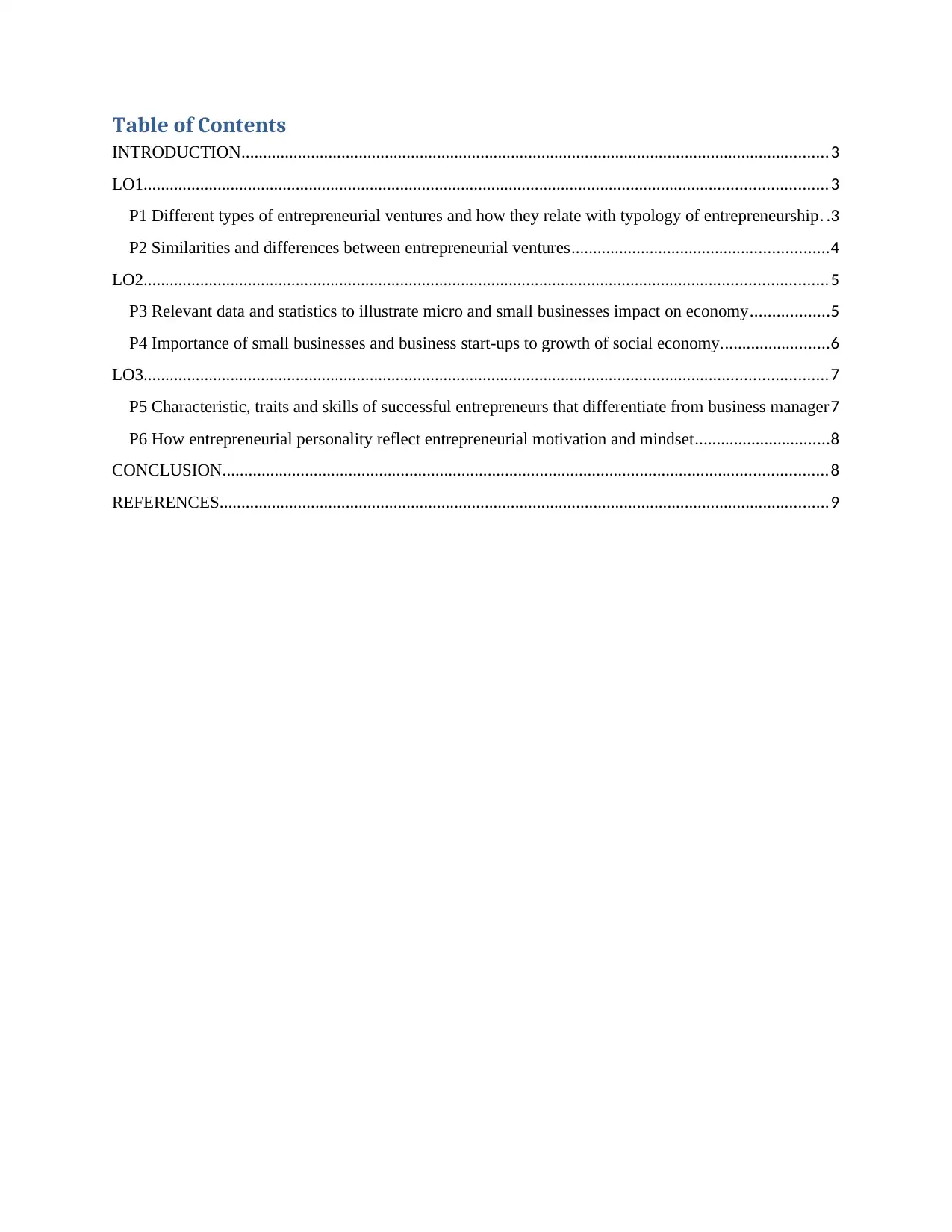
Table of Contents
INTRODUCTION.......................................................................................................................................3
LO1.............................................................................................................................................................3
P1 Different types of entrepreneurial ventures and how they relate with typology of entrepreneurship. .3
P2 Similarities and differences between entrepreneurial ventures...........................................................4
LO2.............................................................................................................................................................5
P3 Relevant data and statistics to illustrate micro and small businesses impact on economy..................5
P4 Importance of small businesses and business start-ups to growth of social economy.........................6
LO3.............................................................................................................................................................7
P5 Characteristic, traits and skills of successful entrepreneurs that differentiate from business manager7
P6 How entrepreneurial personality reflect entrepreneurial motivation and mindset...............................8
CONCLUSION...........................................................................................................................................8
REFERENCES............................................................................................................................................9
INTRODUCTION.......................................................................................................................................3
LO1.............................................................................................................................................................3
P1 Different types of entrepreneurial ventures and how they relate with typology of entrepreneurship. .3
P2 Similarities and differences between entrepreneurial ventures...........................................................4
LO2.............................................................................................................................................................5
P3 Relevant data and statistics to illustrate micro and small businesses impact on economy..................5
P4 Importance of small businesses and business start-ups to growth of social economy.........................6
LO3.............................................................................................................................................................7
P5 Characteristic, traits and skills of successful entrepreneurs that differentiate from business manager7
P6 How entrepreneurial personality reflect entrepreneurial motivation and mindset...............................8
CONCLUSION...........................................................................................................................................8
REFERENCES............................................................................................................................................9
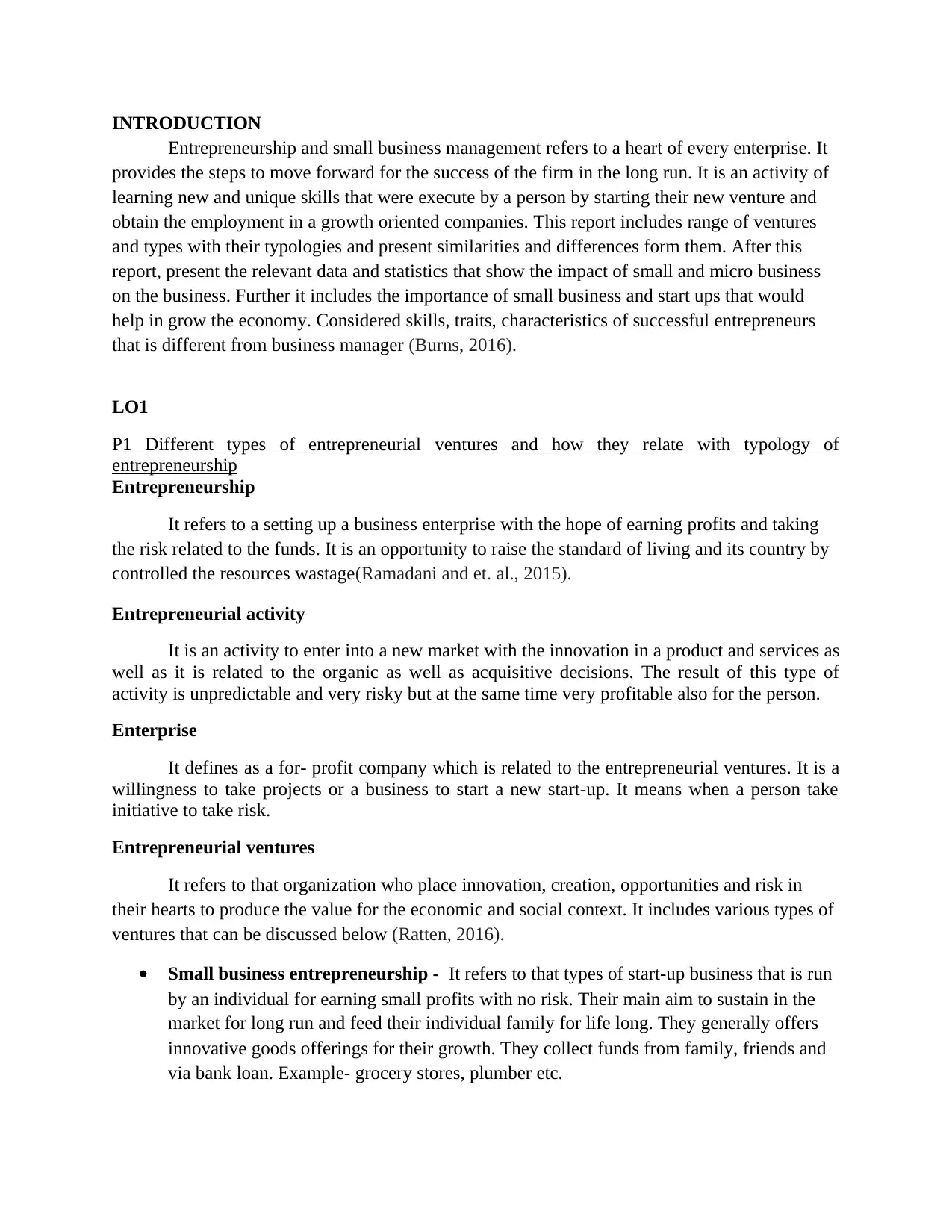
INTRODUCTION
Entrepreneurship and small business management refers to a heart of every enterprise. It
provides the steps to move forward for the success of the firm in the long run. It is an activity of
learning new and unique skills that were execute by a person by starting their new venture and
obtain the employment in a growth oriented companies. This report includes range of ventures
and types with their typologies and present similarities and differences form them. After this
report, present the relevant data and statistics that show the impact of small and micro business
on the business. Further it includes the importance of small business and start ups that would
help in grow the economy. Considered skills, traits, characteristics of successful entrepreneurs
that is different from business manager (Burns, 2016).
LO1
P1 Different types of entrepreneurial ventures and how they relate with typology of
entrepreneurship
Entrepreneurship
It refers to a setting up a business enterprise with the hope of earning profits and taking
the risk related to the funds. It is an opportunity to raise the standard of living and its country by
controlled the resources wastage(Ramadani and et. al., 2015).
Entrepreneurial activity
It is an activity to enter into a new market with the innovation in a product and services as
well as it is related to the organic as well as acquisitive decisions. The result of this type of
activity is unpredictable and very risky but at the same time very profitable also for the person.
Enterprise
It defines as a for- profit company which is related to the entrepreneurial ventures. It is a
willingness to take projects or a business to start a new start-up. It means when a person take
initiative to take risk.
Entrepreneurial ventures
It refers to that organization who place innovation, creation, opportunities and risk in
their hearts to produce the value for the economic and social context. It includes various types of
ventures that can be discussed below (Ratten, 2016).
Small business entrepreneurship - It refers to that types of start-up business that is run
by an individual for earning small profits with no risk. Their main aim to sustain in the
market for long run and feed their individual family for life long. They generally offers
innovative goods offerings for their growth. They collect funds from family, friends and
via bank loan. Example- grocery stores, plumber etc.
Entrepreneurship and small business management refers to a heart of every enterprise. It
provides the steps to move forward for the success of the firm in the long run. It is an activity of
learning new and unique skills that were execute by a person by starting their new venture and
obtain the employment in a growth oriented companies. This report includes range of ventures
and types with their typologies and present similarities and differences form them. After this
report, present the relevant data and statistics that show the impact of small and micro business
on the business. Further it includes the importance of small business and start ups that would
help in grow the economy. Considered skills, traits, characteristics of successful entrepreneurs
that is different from business manager (Burns, 2016).
LO1
P1 Different types of entrepreneurial ventures and how they relate with typology of
entrepreneurship
Entrepreneurship
It refers to a setting up a business enterprise with the hope of earning profits and taking
the risk related to the funds. It is an opportunity to raise the standard of living and its country by
controlled the resources wastage(Ramadani and et. al., 2015).
Entrepreneurial activity
It is an activity to enter into a new market with the innovation in a product and services as
well as it is related to the organic as well as acquisitive decisions. The result of this type of
activity is unpredictable and very risky but at the same time very profitable also for the person.
Enterprise
It defines as a for- profit company which is related to the entrepreneurial ventures. It is a
willingness to take projects or a business to start a new start-up. It means when a person take
initiative to take risk.
Entrepreneurial ventures
It refers to that organization who place innovation, creation, opportunities and risk in
their hearts to produce the value for the economic and social context. It includes various types of
ventures that can be discussed below (Ratten, 2016).
Small business entrepreneurship - It refers to that types of start-up business that is run
by an individual for earning small profits with no risk. Their main aim to sustain in the
market for long run and feed their individual family for life long. They generally offers
innovative goods offerings for their growth. They collect funds from family, friends and
via bank loan. Example- grocery stores, plumber etc.
⊘ This is a preview!⊘
Do you want full access?
Subscribe today to unlock all pages.

Trusted by 1+ million students worldwide
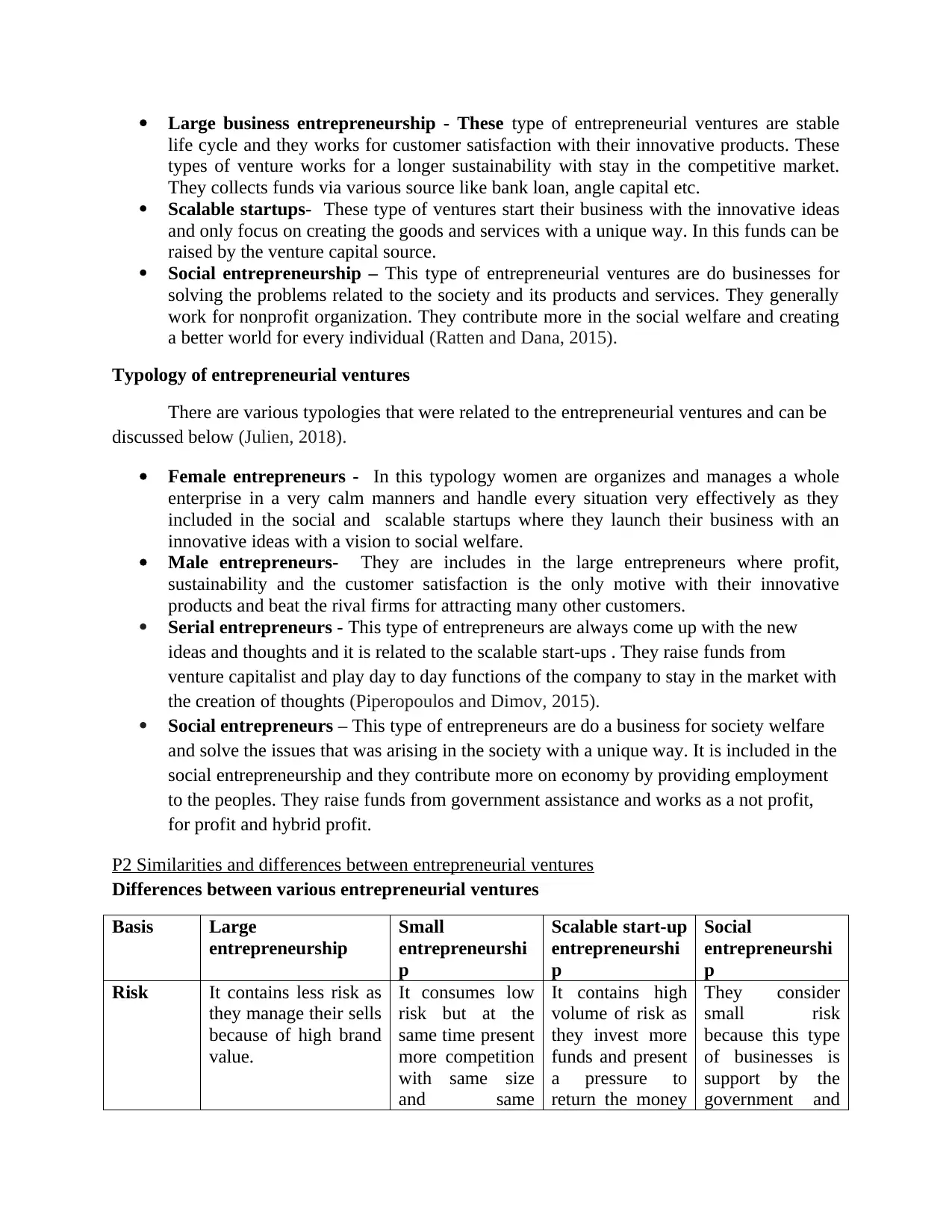
Large business entrepreneurship - These type of entrepreneurial ventures are stable
life cycle and they works for customer satisfaction with their innovative products. These
types of venture works for a longer sustainability with stay in the competitive market.
They collects funds via various source like bank loan, angle capital etc.
Scalable startups- These type of ventures start their business with the innovative ideas
and only focus on creating the goods and services with a unique way. In this funds can be
raised by the venture capital source.
Social entrepreneurship – This type of entrepreneurial ventures are do businesses for
solving the problems related to the society and its products and services. They generally
work for nonprofit organization. They contribute more in the social welfare and creating
a better world for every individual (Ratten and Dana, 2015).
Typology of entrepreneurial ventures
There are various typologies that were related to the entrepreneurial ventures and can be
discussed below (Julien, 2018).
Female entrepreneurs - In this typology women are organizes and manages a whole
enterprise in a very calm manners and handle every situation very effectively as they
included in the social and scalable startups where they launch their business with an
innovative ideas with a vision to social welfare.
Male entrepreneurs- They are includes in the large entrepreneurs where profit,
sustainability and the customer satisfaction is the only motive with their innovative
products and beat the rival firms for attracting many other customers.
Serial entrepreneurs - This type of entrepreneurs are always come up with the new
ideas and thoughts and it is related to the scalable start-ups . They raise funds from
venture capitalist and play day to day functions of the company to stay in the market with
the creation of thoughts (Piperopoulos and Dimov, 2015).
Social entrepreneurs – This type of entrepreneurs are do a business for society welfare
and solve the issues that was arising in the society with a unique way. It is included in the
social entrepreneurship and they contribute more on economy by providing employment
to the peoples. They raise funds from government assistance and works as a not profit,
for profit and hybrid profit.
P2 Similarities and differences between entrepreneurial ventures
Differences between various entrepreneurial ventures
Basis Large
entrepreneurship
Small
entrepreneurshi
p
Scalable start-up
entrepreneurshi
p
Social
entrepreneurshi
p
Risk It contains less risk as
they manage their sells
because of high brand
value.
It consumes low
risk but at the
same time present
more competition
with same size
and same
It contains high
volume of risk as
they invest more
funds and present
a pressure to
return the money
They consider
small risk
because this type
of businesses is
support by the
government and
life cycle and they works for customer satisfaction with their innovative products. These
types of venture works for a longer sustainability with stay in the competitive market.
They collects funds via various source like bank loan, angle capital etc.
Scalable startups- These type of ventures start their business with the innovative ideas
and only focus on creating the goods and services with a unique way. In this funds can be
raised by the venture capital source.
Social entrepreneurship – This type of entrepreneurial ventures are do businesses for
solving the problems related to the society and its products and services. They generally
work for nonprofit organization. They contribute more in the social welfare and creating
a better world for every individual (Ratten and Dana, 2015).
Typology of entrepreneurial ventures
There are various typologies that were related to the entrepreneurial ventures and can be
discussed below (Julien, 2018).
Female entrepreneurs - In this typology women are organizes and manages a whole
enterprise in a very calm manners and handle every situation very effectively as they
included in the social and scalable startups where they launch their business with an
innovative ideas with a vision to social welfare.
Male entrepreneurs- They are includes in the large entrepreneurs where profit,
sustainability and the customer satisfaction is the only motive with their innovative
products and beat the rival firms for attracting many other customers.
Serial entrepreneurs - This type of entrepreneurs are always come up with the new
ideas and thoughts and it is related to the scalable start-ups . They raise funds from
venture capitalist and play day to day functions of the company to stay in the market with
the creation of thoughts (Piperopoulos and Dimov, 2015).
Social entrepreneurs – This type of entrepreneurs are do a business for society welfare
and solve the issues that was arising in the society with a unique way. It is included in the
social entrepreneurship and they contribute more on economy by providing employment
to the peoples. They raise funds from government assistance and works as a not profit,
for profit and hybrid profit.
P2 Similarities and differences between entrepreneurial ventures
Differences between various entrepreneurial ventures
Basis Large
entrepreneurship
Small
entrepreneurshi
p
Scalable start-up
entrepreneurshi
p
Social
entrepreneurshi
p
Risk It contains less risk as
they manage their sells
because of high brand
value.
It consumes low
risk but at the
same time present
more competition
with same size
and same
It contains high
volume of risk as
they invest more
funds and present
a pressure to
return the money
They consider
small risk
because this type
of businesses is
support by the
government and
Paraphrase This Document
Need a fresh take? Get an instant paraphrase of this document with our AI Paraphraser
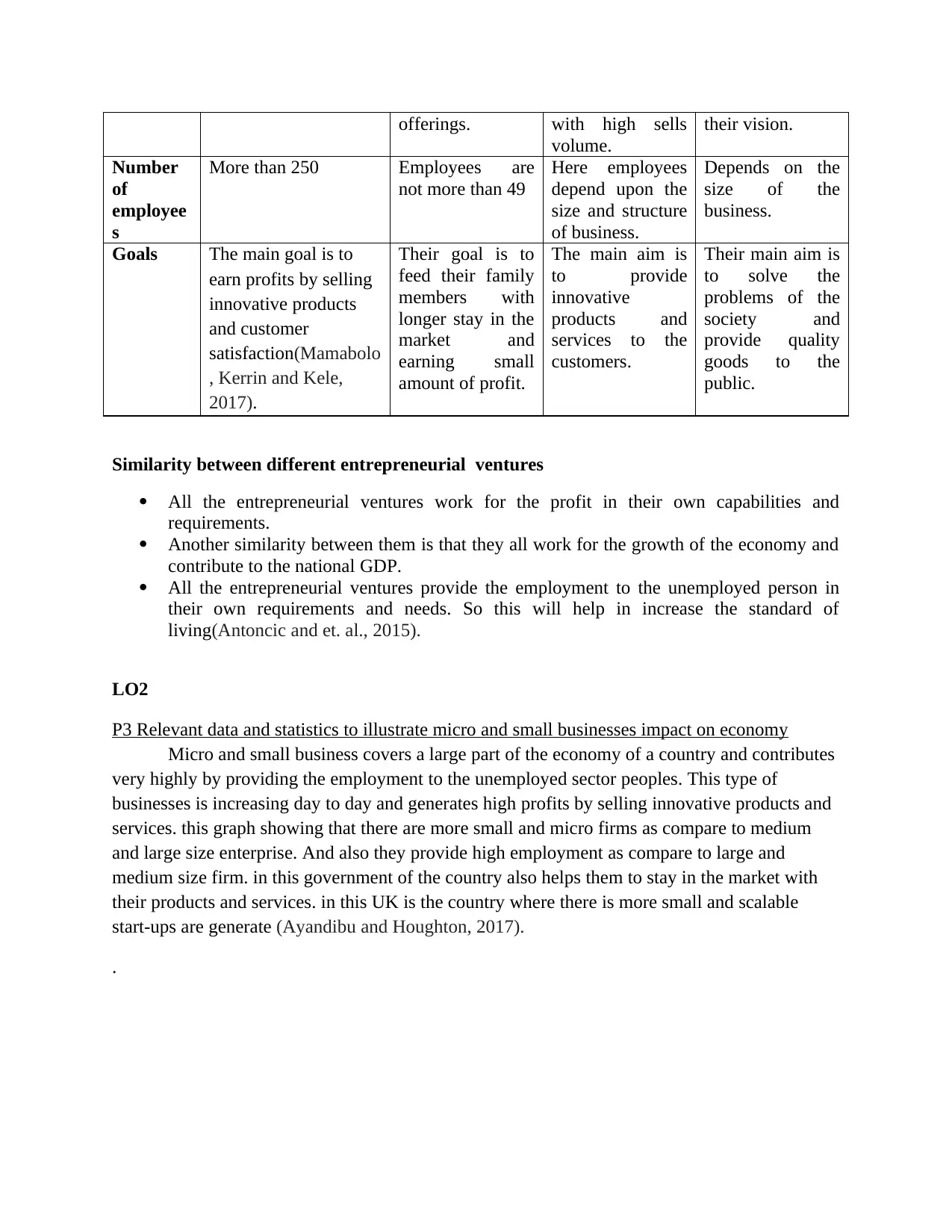
offerings. with high sells
volume.
their vision.
Number
of
employee
s
More than 250 Employees are
not more than 49
Here employees
depend upon the
size and structure
of business.
Depends on the
size of the
business.
Goals The main goal is to
earn profits by selling
innovative products
and customer
satisfaction(Mamabolo
, Kerrin and Kele,
2017).
Their goal is to
feed their family
members with
longer stay in the
market and
earning small
amount of profit.
The main aim is
to provide
innovative
products and
services to the
customers.
Their main aim is
to solve the
problems of the
society and
provide quality
goods to the
public.
Similarity between different entrepreneurial ventures
All the entrepreneurial ventures work for the profit in their own capabilities and
requirements.
Another similarity between them is that they all work for the growth of the economy and
contribute to the national GDP.
All the entrepreneurial ventures provide the employment to the unemployed person in
their own requirements and needs. So this will help in increase the standard of
living(Antoncic and et. al., 2015).
LO2
P3 Relevant data and statistics to illustrate micro and small businesses impact on economy
Micro and small business covers a large part of the economy of a country and contributes
very highly by providing the employment to the unemployed sector peoples. This type of
businesses is increasing day to day and generates high profits by selling innovative products and
services. this graph showing that there are more small and micro firms as compare to medium
and large size enterprise. And also they provide high employment as compare to large and
medium size firm. in this government of the country also helps them to stay in the market with
their products and services. in this UK is the country where there is more small and scalable
start-ups are generate (Ayandibu and Houghton, 2017).
.
volume.
their vision.
Number
of
employee
s
More than 250 Employees are
not more than 49
Here employees
depend upon the
size and structure
of business.
Depends on the
size of the
business.
Goals The main goal is to
earn profits by selling
innovative products
and customer
satisfaction(Mamabolo
, Kerrin and Kele,
2017).
Their goal is to
feed their family
members with
longer stay in the
market and
earning small
amount of profit.
The main aim is
to provide
innovative
products and
services to the
customers.
Their main aim is
to solve the
problems of the
society and
provide quality
goods to the
public.
Similarity between different entrepreneurial ventures
All the entrepreneurial ventures work for the profit in their own capabilities and
requirements.
Another similarity between them is that they all work for the growth of the economy and
contribute to the national GDP.
All the entrepreneurial ventures provide the employment to the unemployed person in
their own requirements and needs. So this will help in increase the standard of
living(Antoncic and et. al., 2015).
LO2
P3 Relevant data and statistics to illustrate micro and small businesses impact on economy
Micro and small business covers a large part of the economy of a country and contributes
very highly by providing the employment to the unemployed sector peoples. This type of
businesses is increasing day to day and generates high profits by selling innovative products and
services. this graph showing that there are more small and micro firms as compare to medium
and large size enterprise. And also they provide high employment as compare to large and
medium size firm. in this government of the country also helps them to stay in the market with
their products and services. in this UK is the country where there is more small and scalable
start-ups are generate (Ayandibu and Houghton, 2017).
.
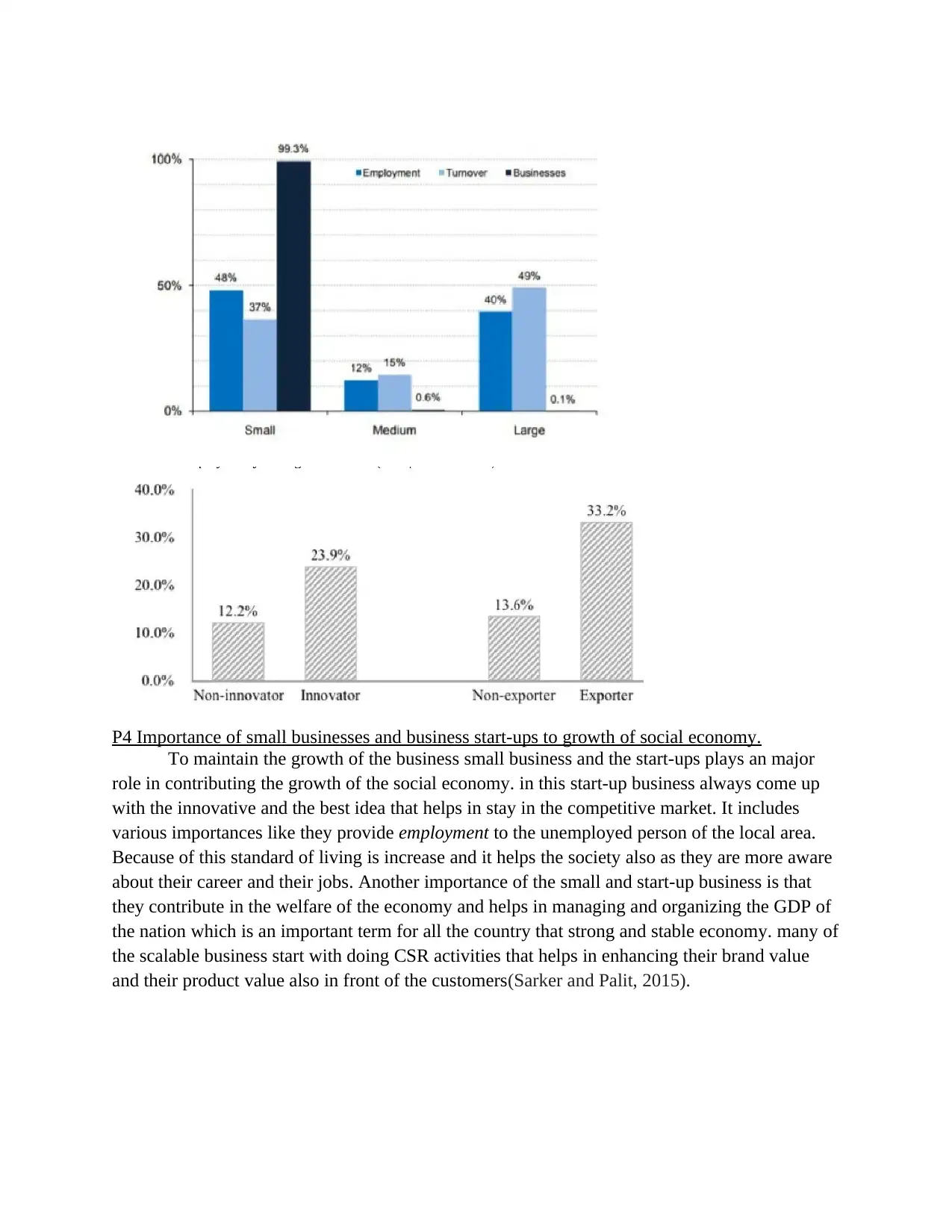
P4 Importance of small businesses and business start-ups to growth of social economy.
To maintain the growth of the business small business and the start-ups plays an major
role in contributing the growth of the social economy. in this start-up business always come up
with the innovative and the best idea that helps in stay in the competitive market. It includes
various importances like they provide employment to the unemployed person of the local area.
Because of this standard of living is increase and it helps the society also as they are more aware
about their career and their jobs. Another importance of the small and start-up business is that
they contribute in the welfare of the economy and helps in managing and organizing the GDP of
the nation which is an important term for all the country that strong and stable economy. many of
the scalable business start with doing CSR activities that helps in enhancing their brand value
and their product value also in front of the customers(Sarker and Palit, 2015).
To maintain the growth of the business small business and the start-ups plays an major
role in contributing the growth of the social economy. in this start-up business always come up
with the innovative and the best idea that helps in stay in the competitive market. It includes
various importances like they provide employment to the unemployed person of the local area.
Because of this standard of living is increase and it helps the society also as they are more aware
about their career and their jobs. Another importance of the small and start-up business is that
they contribute in the welfare of the economy and helps in managing and organizing the GDP of
the nation which is an important term for all the country that strong and stable economy. many of
the scalable business start with doing CSR activities that helps in enhancing their brand value
and their product value also in front of the customers(Sarker and Palit, 2015).
⊘ This is a preview!⊘
Do you want full access?
Subscribe today to unlock all pages.

Trusted by 1+ million students worldwide
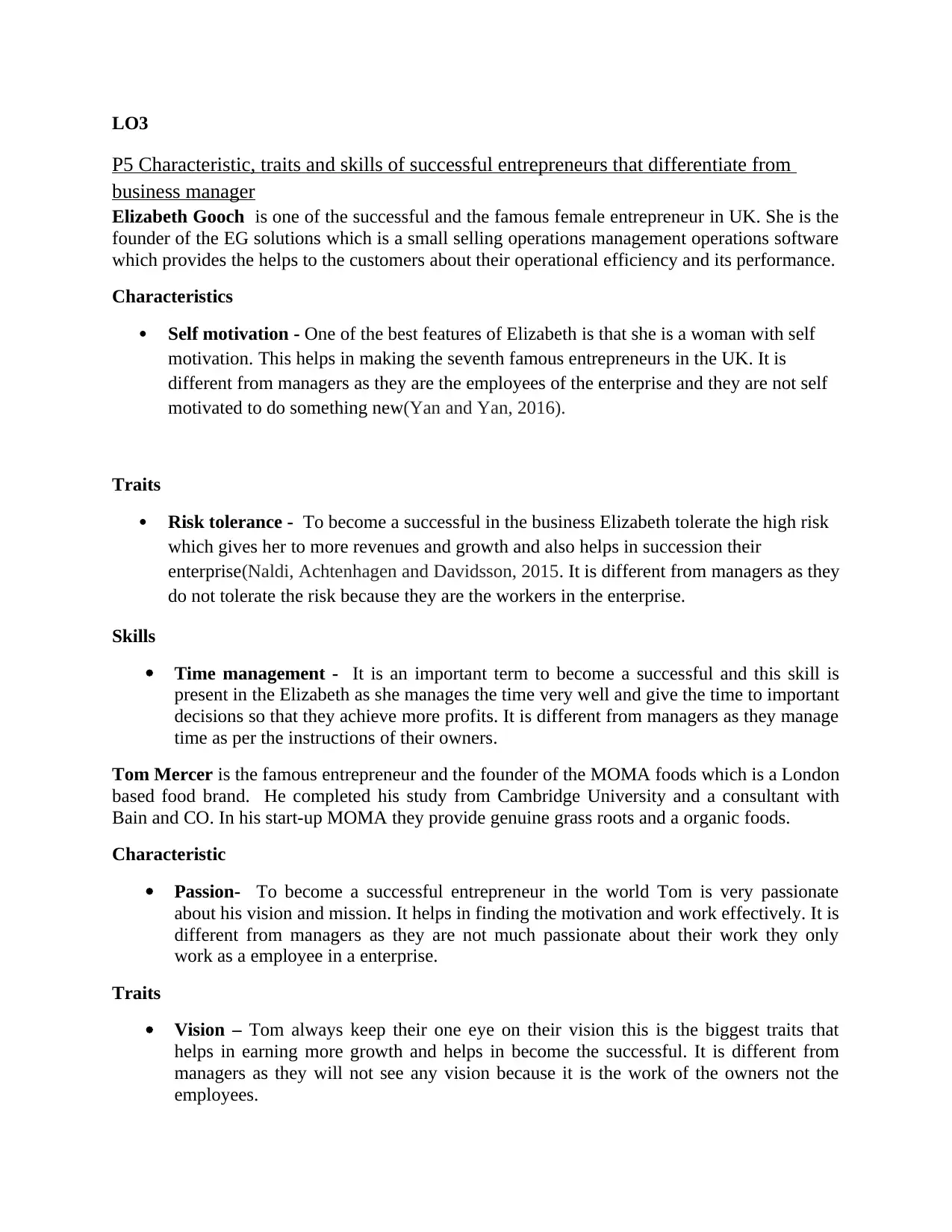
LO3
P5 Characteristic, traits and skills of successful entrepreneurs that differentiate from
business manager
Elizabeth Gooch is one of the successful and the famous female entrepreneur in UK. She is the
founder of the EG solutions which is a small selling operations management operations software
which provides the helps to the customers about their operational efficiency and its performance.
Characteristics
Self motivation - One of the best features of Elizabeth is that she is a woman with self
motivation. This helps in making the seventh famous entrepreneurs in the UK. It is
different from managers as they are the employees of the enterprise and they are not self
motivated to do something new(Yan and Yan, 2016).
Traits
Risk tolerance - To become a successful in the business Elizabeth tolerate the high risk
which gives her to more revenues and growth and also helps in succession their
enterprise(Naldi, Achtenhagen and Davidsson, 2015. It is different from managers as they
do not tolerate the risk because they are the workers in the enterprise.
Skills
Time management - It is an important term to become a successful and this skill is
present in the Elizabeth as she manages the time very well and give the time to important
decisions so that they achieve more profits. It is different from managers as they manage
time as per the instructions of their owners.
Tom Mercer is the famous entrepreneur and the founder of the MOMA foods which is a London
based food brand. He completed his study from Cambridge University and a consultant with
Bain and CO. In his start-up MOMA they provide genuine grass roots and a organic foods.
Characteristic
Passion- To become a successful entrepreneur in the world Tom is very passionate
about his vision and mission. It helps in finding the motivation and work effectively. It is
different from managers as they are not much passionate about their work they only
work as a employee in a enterprise.
Traits
Vision – Tom always keep their one eye on their vision this is the biggest traits that
helps in earning more growth and helps in become the successful. It is different from
managers as they will not see any vision because it is the work of the owners not the
employees.
P5 Characteristic, traits and skills of successful entrepreneurs that differentiate from
business manager
Elizabeth Gooch is one of the successful and the famous female entrepreneur in UK. She is the
founder of the EG solutions which is a small selling operations management operations software
which provides the helps to the customers about their operational efficiency and its performance.
Characteristics
Self motivation - One of the best features of Elizabeth is that she is a woman with self
motivation. This helps in making the seventh famous entrepreneurs in the UK. It is
different from managers as they are the employees of the enterprise and they are not self
motivated to do something new(Yan and Yan, 2016).
Traits
Risk tolerance - To become a successful in the business Elizabeth tolerate the high risk
which gives her to more revenues and growth and also helps in succession their
enterprise(Naldi, Achtenhagen and Davidsson, 2015. It is different from managers as they
do not tolerate the risk because they are the workers in the enterprise.
Skills
Time management - It is an important term to become a successful and this skill is
present in the Elizabeth as she manages the time very well and give the time to important
decisions so that they achieve more profits. It is different from managers as they manage
time as per the instructions of their owners.
Tom Mercer is the famous entrepreneur and the founder of the MOMA foods which is a London
based food brand. He completed his study from Cambridge University and a consultant with
Bain and CO. In his start-up MOMA they provide genuine grass roots and a organic foods.
Characteristic
Passion- To become a successful entrepreneur in the world Tom is very passionate
about his vision and mission. It helps in finding the motivation and work effectively. It is
different from managers as they are not much passionate about their work they only
work as a employee in a enterprise.
Traits
Vision – Tom always keep their one eye on their vision this is the biggest traits that
helps in earning more growth and helps in become the successful. It is different from
managers as they will not see any vision because it is the work of the owners not the
employees.
Paraphrase This Document
Need a fresh take? Get an instant paraphrase of this document with our AI Paraphraser
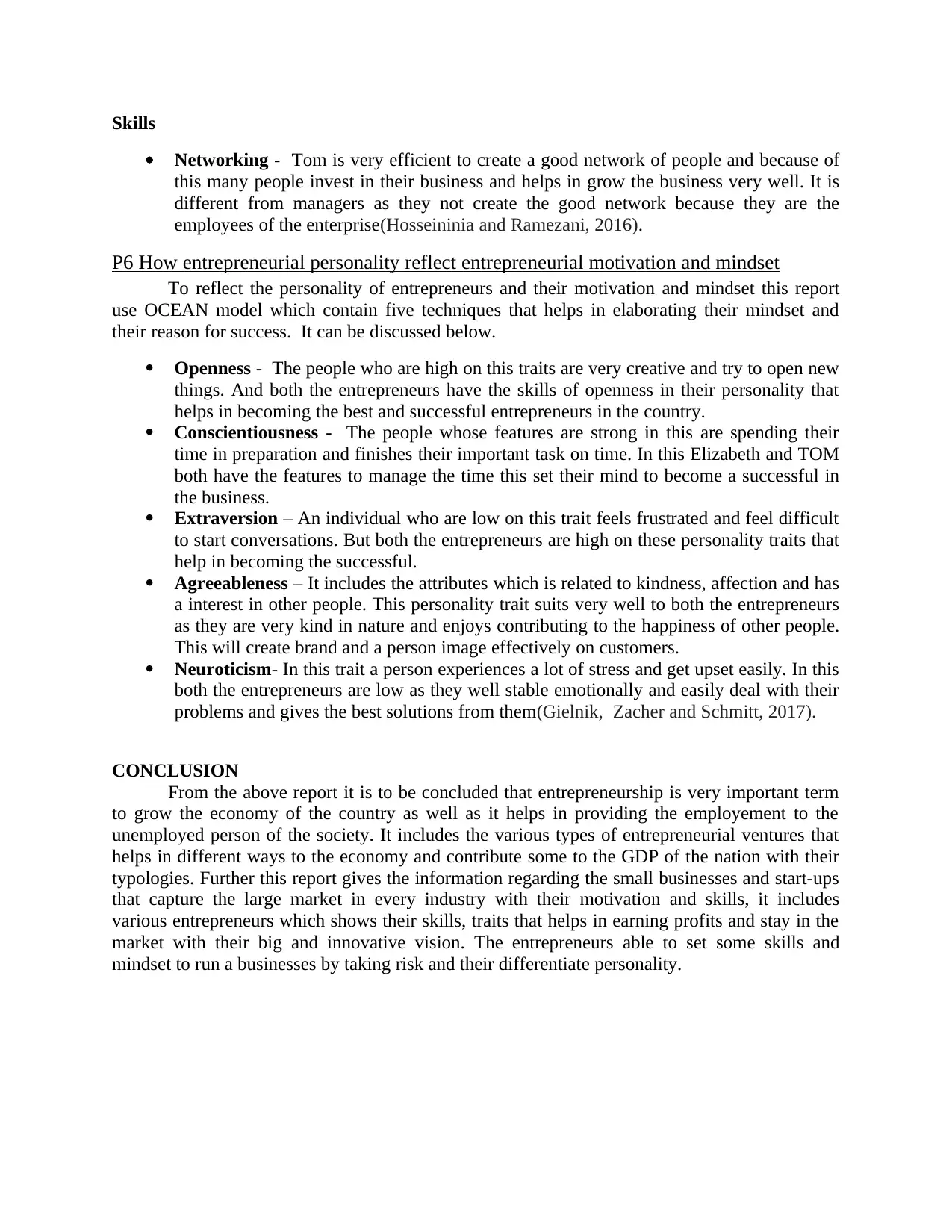
Skills
Networking - Tom is very efficient to create a good network of people and because of
this many people invest in their business and helps in grow the business very well. It is
different from managers as they not create the good network because they are the
employees of the enterprise(Hosseininia and Ramezani, 2016).
P6 How entrepreneurial personality reflect entrepreneurial motivation and mindset
To reflect the personality of entrepreneurs and their motivation and mindset this report
use OCEAN model which contain five techniques that helps in elaborating their mindset and
their reason for success. It can be discussed below.
Openness - The people who are high on this traits are very creative and try to open new
things. And both the entrepreneurs have the skills of openness in their personality that
helps in becoming the best and successful entrepreneurs in the country.
Conscientiousness - The people whose features are strong in this are spending their
time in preparation and finishes their important task on time. In this Elizabeth and TOM
both have the features to manage the time this set their mind to become a successful in
the business.
Extraversion – An individual who are low on this trait feels frustrated and feel difficult
to start conversations. But both the entrepreneurs are high on these personality traits that
help in becoming the successful.
Agreeableness – It includes the attributes which is related to kindness, affection and has
a interest in other people. This personality trait suits very well to both the entrepreneurs
as they are very kind in nature and enjoys contributing to the happiness of other people.
This will create brand and a person image effectively on customers.
Neuroticism- In this trait a person experiences a lot of stress and get upset easily. In this
both the entrepreneurs are low as they well stable emotionally and easily deal with their
problems and gives the best solutions from them(Gielnik, Zacher and Schmitt, 2017).
CONCLUSION
From the above report it is to be concluded that entrepreneurship is very important term
to grow the economy of the country as well as it helps in providing the employement to the
unemployed person of the society. It includes the various types of entrepreneurial ventures that
helps in different ways to the economy and contribute some to the GDP of the nation with their
typologies. Further this report gives the information regarding the small businesses and start-ups
that capture the large market in every industry with their motivation and skills, it includes
various entrepreneurs which shows their skills, traits that helps in earning profits and stay in the
market with their big and innovative vision. The entrepreneurs able to set some skills and
mindset to run a businesses by taking risk and their differentiate personality.
Networking - Tom is very efficient to create a good network of people and because of
this many people invest in their business and helps in grow the business very well. It is
different from managers as they not create the good network because they are the
employees of the enterprise(Hosseininia and Ramezani, 2016).
P6 How entrepreneurial personality reflect entrepreneurial motivation and mindset
To reflect the personality of entrepreneurs and their motivation and mindset this report
use OCEAN model which contain five techniques that helps in elaborating their mindset and
their reason for success. It can be discussed below.
Openness - The people who are high on this traits are very creative and try to open new
things. And both the entrepreneurs have the skills of openness in their personality that
helps in becoming the best and successful entrepreneurs in the country.
Conscientiousness - The people whose features are strong in this are spending their
time in preparation and finishes their important task on time. In this Elizabeth and TOM
both have the features to manage the time this set their mind to become a successful in
the business.
Extraversion – An individual who are low on this trait feels frustrated and feel difficult
to start conversations. But both the entrepreneurs are high on these personality traits that
help in becoming the successful.
Agreeableness – It includes the attributes which is related to kindness, affection and has
a interest in other people. This personality trait suits very well to both the entrepreneurs
as they are very kind in nature and enjoys contributing to the happiness of other people.
This will create brand and a person image effectively on customers.
Neuroticism- In this trait a person experiences a lot of stress and get upset easily. In this
both the entrepreneurs are low as they well stable emotionally and easily deal with their
problems and gives the best solutions from them(Gielnik, Zacher and Schmitt, 2017).
CONCLUSION
From the above report it is to be concluded that entrepreneurship is very important term
to grow the economy of the country as well as it helps in providing the employement to the
unemployed person of the society. It includes the various types of entrepreneurial ventures that
helps in different ways to the economy and contribute some to the GDP of the nation with their
typologies. Further this report gives the information regarding the small businesses and start-ups
that capture the large market in every industry with their motivation and skills, it includes
various entrepreneurs which shows their skills, traits that helps in earning profits and stay in the
market with their big and innovative vision. The entrepreneurs able to set some skills and
mindset to run a businesses by taking risk and their differentiate personality.
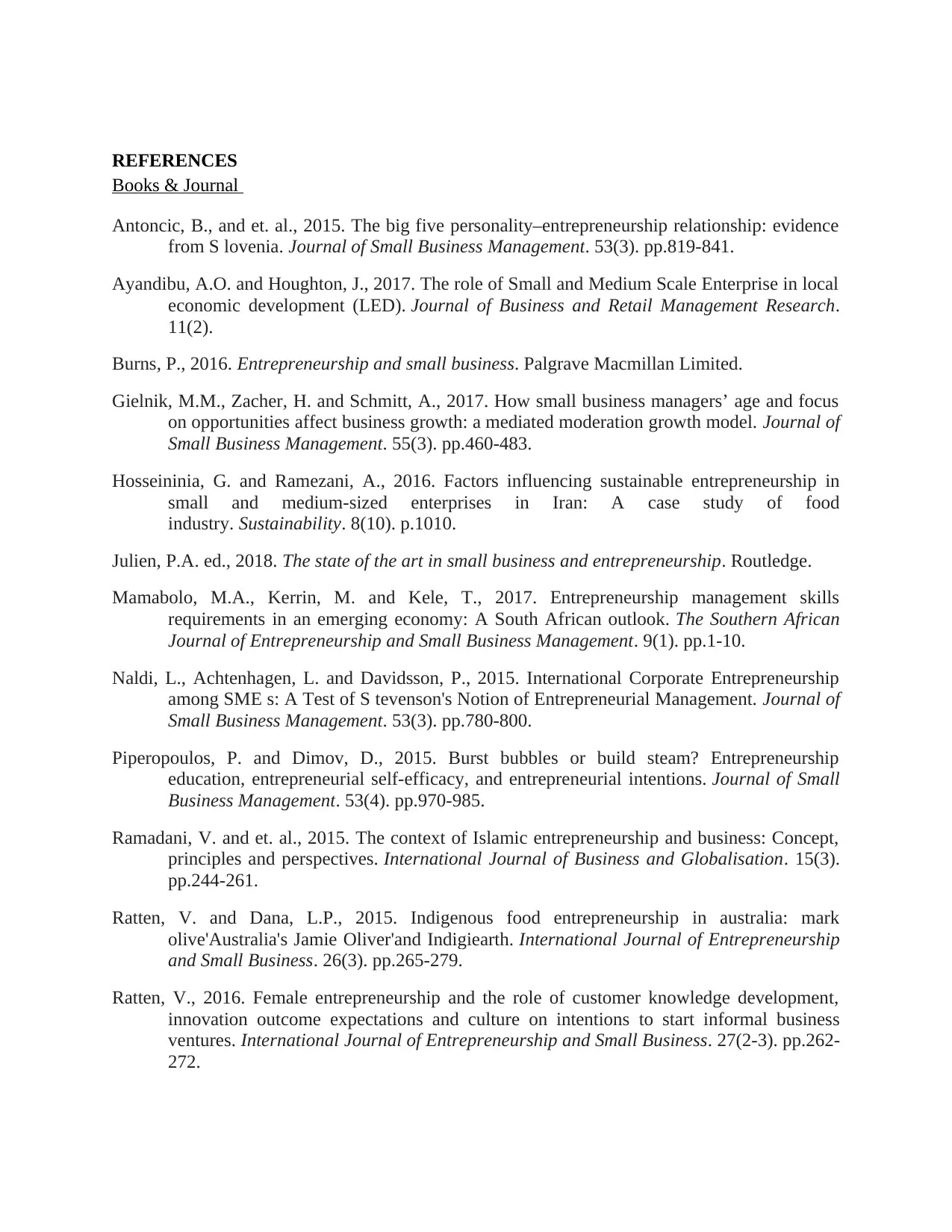
REFERENCES
Books & Journal
Antoncic, B., and et. al., 2015. The big five personality–entrepreneurship relationship: evidence
from S lovenia. Journal of Small Business Management. 53(3). pp.819-841.
Ayandibu, A.O. and Houghton, J., 2017. The role of Small and Medium Scale Enterprise in local
economic development (LED). Journal of Business and Retail Management Research.
11(2).
Burns, P., 2016. Entrepreneurship and small business. Palgrave Macmillan Limited.
Gielnik, M.M., Zacher, H. and Schmitt, A., 2017. How small business managers’ age and focus
on opportunities affect business growth: a mediated moderation growth model. Journal of
Small Business Management. 55(3). pp.460-483.
Hosseininia, G. and Ramezani, A., 2016. Factors influencing sustainable entrepreneurship in
small and medium-sized enterprises in Iran: A case study of food
industry. Sustainability. 8(10). p.1010.
Julien, P.A. ed., 2018. The state of the art in small business and entrepreneurship. Routledge.
Mamabolo, M.A., Kerrin, M. and Kele, T., 2017. Entrepreneurship management skills
requirements in an emerging economy: A South African outlook. The Southern African
Journal of Entrepreneurship and Small Business Management. 9(1). pp.1-10.
Naldi, L., Achtenhagen, L. and Davidsson, P., 2015. International Corporate Entrepreneurship
among SME s: A Test of S tevenson's Notion of Entrepreneurial Management. Journal of
Small Business Management. 53(3). pp.780-800.
Piperopoulos, P. and Dimov, D., 2015. Burst bubbles or build steam? Entrepreneurship
education, entrepreneurial self‐efficacy, and entrepreneurial intentions. Journal of Small
Business Management. 53(4). pp.970-985.
Ramadani, V. and et. al., 2015. The context of Islamic entrepreneurship and business: Concept,
principles and perspectives. International Journal of Business and Globalisation. 15(3).
pp.244-261.
Ratten, V. and Dana, L.P., 2015. Indigenous food entrepreneurship in australia: mark
olive'Australia's Jamie Oliver'and Indigiearth. International Journal of Entrepreneurship
and Small Business. 26(3). pp.265-279.
Ratten, V., 2016. Female entrepreneurship and the role of customer knowledge development,
innovation outcome expectations and culture on intentions to start informal business
ventures. International Journal of Entrepreneurship and Small Business. 27(2-3). pp.262-
272.
Books & Journal
Antoncic, B., and et. al., 2015. The big five personality–entrepreneurship relationship: evidence
from S lovenia. Journal of Small Business Management. 53(3). pp.819-841.
Ayandibu, A.O. and Houghton, J., 2017. The role of Small and Medium Scale Enterprise in local
economic development (LED). Journal of Business and Retail Management Research.
11(2).
Burns, P., 2016. Entrepreneurship and small business. Palgrave Macmillan Limited.
Gielnik, M.M., Zacher, H. and Schmitt, A., 2017. How small business managers’ age and focus
on opportunities affect business growth: a mediated moderation growth model. Journal of
Small Business Management. 55(3). pp.460-483.
Hosseininia, G. and Ramezani, A., 2016. Factors influencing sustainable entrepreneurship in
small and medium-sized enterprises in Iran: A case study of food
industry. Sustainability. 8(10). p.1010.
Julien, P.A. ed., 2018. The state of the art in small business and entrepreneurship. Routledge.
Mamabolo, M.A., Kerrin, M. and Kele, T., 2017. Entrepreneurship management skills
requirements in an emerging economy: A South African outlook. The Southern African
Journal of Entrepreneurship and Small Business Management. 9(1). pp.1-10.
Naldi, L., Achtenhagen, L. and Davidsson, P., 2015. International Corporate Entrepreneurship
among SME s: A Test of S tevenson's Notion of Entrepreneurial Management. Journal of
Small Business Management. 53(3). pp.780-800.
Piperopoulos, P. and Dimov, D., 2015. Burst bubbles or build steam? Entrepreneurship
education, entrepreneurial self‐efficacy, and entrepreneurial intentions. Journal of Small
Business Management. 53(4). pp.970-985.
Ramadani, V. and et. al., 2015. The context of Islamic entrepreneurship and business: Concept,
principles and perspectives. International Journal of Business and Globalisation. 15(3).
pp.244-261.
Ratten, V. and Dana, L.P., 2015. Indigenous food entrepreneurship in australia: mark
olive'Australia's Jamie Oliver'and Indigiearth. International Journal of Entrepreneurship
and Small Business. 26(3). pp.265-279.
Ratten, V., 2016. Female entrepreneurship and the role of customer knowledge development,
innovation outcome expectations and culture on intentions to start informal business
ventures. International Journal of Entrepreneurship and Small Business. 27(2-3). pp.262-
272.
⊘ This is a preview!⊘
Do you want full access?
Subscribe today to unlock all pages.

Trusted by 1+ million students worldwide

Sarker, S. and Palit, M., 2015. Strategic orientation and performance of small and medium
enterprises in Bangladesh. International Journal of Entrepreneurship and Small
Business. 24(4). pp.572-586.
Yan, J. and Yan, L., 2016. Individual entrepreneurship, collective entrepreneurship and
innovation in small business: an empirical study. International Entrepreneurship and
Management Journal. 12(4). pp.1053-1077.
enterprises in Bangladesh. International Journal of Entrepreneurship and Small
Business. 24(4). pp.572-586.
Yan, J. and Yan, L., 2016. Individual entrepreneurship, collective entrepreneurship and
innovation in small business: an empirical study. International Entrepreneurship and
Management Journal. 12(4). pp.1053-1077.
1 out of 10
Related Documents
Your All-in-One AI-Powered Toolkit for Academic Success.
+13062052269
info@desklib.com
Available 24*7 on WhatsApp / Email
![[object Object]](/_next/static/media/star-bottom.7253800d.svg)
Unlock your academic potential
Copyright © 2020–2026 A2Z Services. All Rights Reserved. Developed and managed by ZUCOL.





